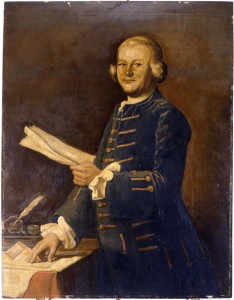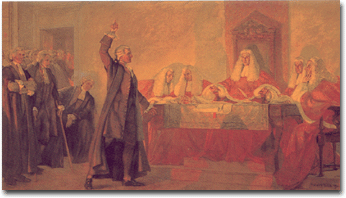 Most people have never heard of James Otis and the part he played in American history, but he could easily have the title of First Leader of Resistance to the British Tyranny. Here are the facts.
Most people have never heard of James Otis and the part he played in American history, but he could easily have the title of First Leader of Resistance to the British Tyranny. Here are the facts.
The Great Constitutional Debate Period prior to the American Revolution ranged from 1761-1776. It was a unique period in history, very unlike most others, when debate over the proper role of government and the basic rights of the people came to the forefront. Usually, people just let their emotions take over and rise up against what they believe to be an oppressor—witness both the French and the Russian revolutions.
Not so in the American colonies. Once Britain started violating its own heritage and laws, voices were heard calling the nation back to its roots. Unfortunately, those voices were ignored during this era.
In 1761, Writs of Assistance came into being that allowed the government of Massachusetts to enter into any private citizen’s home and search for whatever the government sought, without any advance notice, and no probable cause or reason had to be given for the search. These were, in effect, general search warrants that went counter to the whole history of British liberty.
Otis, a lawyer, took up the cause of the merchants who were protesting these writs. In a five-hour oration before the Massachusetts Superior Court, Otis marshaled an immense and rich history of British legal precedents in making his case that these writs needed to be eliminated. The Court denied his appeal, but in the words of John Adams, who was there that day to witness Otis’s argument, “Then and there was the first scene of the first act of the opposition to the arbitrary claims of Great Britain. Then and there the child Independence was born.”
Some have seen this oration by Otis as the inspiration for the Fourth Amendment to the Constitution, which protects against unreasonable searches.
Though Otis officially lost his case, he won the title of patriot. He was elected in May 1761 to the Massachusetts General Court, and in 1766, Speaker of that same body, only to have his new position vetoed by the royal governor.
Otis continued to support the colonies in their struggle for equality with Great Britain in his The Rights of the British Colonies Asserted and Proved of 1764 and in opposition of the Sugar Act. He was also present at the Stamp Act Congress in 1765, where delegates cited the recently passed Stamp Act in their further fight against taxation without representation. Though Otis never suggested a full-scale revolution, he continued to fight against the inequitable British government with more pamphlets: A Vindication of the British Colonies and Considerations on Behalf of the British Colonies.
Why do more people not know about Otis? His role steadily diminished as his mental abilities did the same. It’s not known for sure what malady he suffered from, but he developed confusion of thought over time, not helped at all by a blow on the head he received in 1769 from a commissioner of customs.
As he went in and out of lucidity in his waning years, he reportedly said to his sister, Mercy Otis Warren—who incidentally wrote a history of the American Revolution—“My dear sister, I hope, when God Almighty in his righteous providence shall take me out of time into eternity that it will be by a flash of lightning.”
In May 1783, Otis was standing in the doorway of friend’s home during a storm. He was struck by lightning and died instantly. Was this simply a remarkable coincidence or an instance of God’s mercy to one who had suffered so long? You can make your own judgment.
James Otis, though, should be remembered and honored for his strong stand on behalf of the rule of law. We need more individuals like him today.

